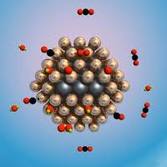 A new drug delivery technique may hold promise for more efficient cancer therapies. The technique involves storing a cancer drug inside tiny objects called nanoparticles which can carry drug molecules and target them to specific cells. Using this method, researchers were able to shrink tumors in mice while using smaller doses of the drug to reduce harmful side effects. For example, the chemotherapy drug cisplatin is an effective cell killer. It's used against half of all human cancers. However, cisplatin carries serious side effects, like kidney and nerve damage. These side effects limit the dose that can be used, which is a problem because the drug only lasts in the bloodstream for a short time.
A new drug delivery technique may hold promise for more efficient cancer therapies. The technique involves storing a cancer drug inside tiny objects called nanoparticles which can carry drug molecules and target them to specific cells. Using this method, researchers were able to shrink tumors in mice while using smaller doses of the drug to reduce harmful side effects. For example, the chemotherapy drug cisplatin is an effective cell killer. It's used against half of all human cancers. However, cisplatin carries serious side effects, like kidney and nerve damage. These side effects limit the dose that can be used, which is a problem because the drug only lasts in the bloodstream for a short time.Recently, a team of scientists from the Massachusetts Institute of Technology and Brigham and Women's Hospital showed that they could store an inactive form of cisplatin, called a prodrug, inside nanoparticles that are engineered to target a specific protein on prostate cancer cells. Once the cells take up the nanoparticle, the prodrug is released and converted to its active form. The team showed that these drug-carrying particles kill cancer cells in culture more efficiently than the drug alone.
Further work will be needed to show whether this technique works as well in humans as it does in small animals. If so, the targeted delivery of drugs using nanoparticles could become an exciting step into the future of cancer therapy. This work was published in the January 10, 2011 issue of the Proceedings of the National Academy of Sciences.
